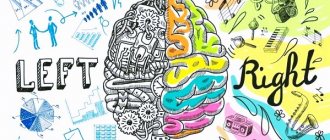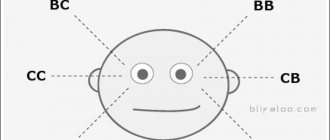Have you ever wondered what it means to be smart? So, we can say for sure that he is smart, an excellent student in the class, and, probably, an employee who performs any task efficiently. What about those who become, for example, artists, writers, composers - are they smart? Of course, it's just different, because knowledge is only part of what actually makes us smart, because a person has multiple intelligences. We re-read Thomas Armstrong’s book “You Can Do More Than You Think” and collected the most interesting facts about the work of our brain and how to develop it comprehensively.
About the theory of multiple intelligences
The author of the theory of multiple intelligences is Harvard professor Howard Gardner, who in the last century began to fight the prejudice that IQ is the only true indicator of our intelligence. Previously, it was assumed that the higher the number, the smarter the person, but modern science says that this is not entirely true.
Over the years, Howard Gardner has worked with adults and children of all ages, analyzing their progress in learning and work. He noticed that some solve equations faster and others slower; Some people are closer to music, while others are closer to literature, and, in fact, almost everything depends on this. The scientist came to the conclusion that all people absorb information and express their abilities differently, and no IQ test can truly measure a person’s intelligence.
This is how the theory of multiple intelligences emerged, according to which nine types of intelligence coexist in every person - in other words, as many as nine different ways of being smart, each of which manifests itself differently and is responsible for different areas of our activity.
HOW TO APPLY THE THEORY TO AN INDIVIDUAL CHILD:
In fact, it is very difficult to find a place in the existing education system to implement the system and theory of Howard Gardner. The whole point is that general developmental programs developed and approved by the relevant authorities cannot be personality-oriented. In them, all children without exception are taught according to a template, without taking into account individual characteristics and more developed ways of perceiving new information. According to the author of the theory, the basic principle is that the educational process should be structured in such a way as to enable children to acquire experience and skills using various types of intelligence. The difficulty lies in the fact that it is very difficult for a teacher to remember and take into account simultaneously different learning styles, as well as the strengths and weaknesses of students during a lesson. In group classes, the verbal-linguistic type of intelligence is most often used. Teaching techniques such as lectures, writing on the board, writing papers, and note-taking are very important. Moreover, they are widely used in the education system, especially as students grow older. The task of educational institutions is the combination and integration of verbal-linguistic intelligence with other types. This will open up new and effective ways for your students to learn and experience. It is important to explain to children from an early age that they can reveal their abilities in various ways, in various types of activities. And in the future, all the necessary conditions for learning are created with an emphasis on the strengths and identified interests of children. Gardner's theory is being widely implemented in various educational and educational centers for child development, which are now being opened more and more often. There it is quite simple to do this, since there is a more serious material base, and the number of students in the group is small. This provides ample opportunities for implementing an individual-oriented approach to development. There are several ways to implement Howard Gardner's theory of multiple intelligences: - Group projects. Small groups are formed in which children perform special activities or work together on a specific project; — Individual projects. The proposed task should allow the individual child's abilities to be explored and developed in a way that suits him; — Creation of groups according to types of intelligence (center for creativity, mathematics, writing, etc.). The main purpose of such groups is to identify and develop discovered abilities. Also, training in such centers is very useful when children are introduced to different types of abilities; — Non-standard planning for studying a specific topic. The main goal of education according to Gardner’s theory is to give the child the opportunity to explore the world, study objects and phenomena in the way that is most close and convenient to him. The baby should feel comfortable in this method of learning. The same material should be presented in a variety of ways in the classroom to engage the maximum number of intelligence types. All centers, providing education to children, are based on generally accepted programs. But they allow kids to learn a topic based on their dominant intelligence types. So, while studying the history of the Egyptian pyramids, one group can build models of pyramids, another can stage a theatrical performance on the theme of Egyptian pharaohs and pyramids, a third can read a book on the history of ancient Egyptian pyramids with the whole class or group, etc. It is important that the centers are equipped accordingly. They must contain all the necessary materials for various types of activities, equipment, furniture. Howard Gardner emphasizes that the degree of development of a particular type of intelligence depends on the frequency of its use in life. The more often this happens, the more opportunities there are to form a certain type of intelligence in the future, the better it will develop. In fact, all types of intelligence are closely related to each other. By developing one, other related types will certainly develop. The average child has several types of intelligence that are well developed: there are several abilities that emerge and develop with ease, others that emerge with effort, and one or more that only emerge with great effort. To determine the percentage of development levels of certain types of intelligence, it is enough to pass a simple test that can be easily found on the Internet. As a result, you will see which abilities and interests are expressed more and which less. Parents, having noticed a child’s inclination towards any type of intelligence, should try to develop these abilities, as well as choose the appropriate methodology for this. It is important to choose the learning style that is ideal for your child. Then the child’s development will be as effective and joyful as possible.
Source: https://www.kroha.net/razvitie_rebenka/igri_i_metodiki/metodika_razvitiya_govarda_gardnera/
Five Tips for Developing Each Type of Intelligence
Probably, while reading descriptions of types of intelligence, you have identified points that are closest to you, and points that are more difficult for you or “not about you at all” - this is completely normal, especially if you concentrate on one area of your life, but forget or you don’t see the point in paying attention to the other. However, since all aspects are certainly important for comprehensive development, here are some simple, practical tips to help develop and maintain each type of intelligence:
Verbal intelligence
- Write down all the ideas that come to your mind.
- Tell stories: be it anecdote from your life or excerpts from books you have read.
- If you don't know the meaning of a word, find it out using a dictionary.
- Read what interests you, and it doesn’t matter whether it’s a glossy magazine or a work by a world classic.
- Keep a diary and write down absolutely everything you want.
Musical intelligence
- Sing with friends and alone, even if you think you don't have a voice.
- Play music games, such as Guess the Tune.
- Listen to live music.
- Don't just listen to the music, but do it carefully: try to catch the sound of individual instruments, transitions, tonality and timbre.
- Finally, sign up for lessons on any instrument you like. Surely you have been wanting to try it for a very long time!
Logical-mathematical intelligence
- Play games that require strategy and logic. For example: checkers, chess, dominoes or strategic games on a computer or smartphone.
- Read scientific journals and broadcasts.
- Make it a habit to spend 10-15 minutes solving riddles and logic puzzles.
- Try periodically conducting experiments at home (only without threat to life, of course).
- Pay more attention to the numbers in the news.
Imaginative intelligence
- Explore art - from cinematography to painting. Go to museums, galleries, buy books with large illustrations.
- Draw whatever comes to your mind, and also sketch what is happening around you. Even if you think you don't know how.
- Pay attention to the world around you and photograph what you find interesting.
- Look for patterns and regularities in the design, architecture, and even in the markings on the road around you.
- Try communicating with friends or family through pictures. Draw, and let them respond to you with a drawing.
Bodily intelligence
- As trite as it may seem, play sports. It is not necessary to devote most of your time to it; it will be enough to get into the habit of doing exercises in the morning.
- Try reaching your tongue with your nose, learn to move your ears or raise your eyebrows in turn - this is also a good workout for your brain.
- Play charades, use body language to explain things.
- Engage in creative activities that involve working with your hands: embroidery, drawing, sewing, and so on.
- Meditate. Try to feel every part of your body, explore it, alternately tensing and relaxing all your muscles.
Social intelligence
- Make new acquaintances. Set a goal to communicate every day, week or month with a stranger. How many acquaintances there will be is up to you.
- Become a volunteer. The Red Cross, WWF, UNICEF and many other local organizations need those who will help them.
- Spend more time with your loved ones. Try making it a tradition to get together with family or friends on Fridays, play board games, go to events—whatever.
- Don't miss opportunities to learn from other people. We are all different, and for sure, if you talk to someone, you can learn something interesting.
- Try not to judge a person without knowing him. Labels are, of course, convenient, but not always honest and fair. Get to know the other person before jumping to any conclusion.
Intrapersonal intelligence
- Try to put everything aside and ask yourself: “Who am I?” Think about what kind of person you are, what is important to you, what makes you happy, what upsets you. And it’s better to record all the answers on paper, in detail and slowly.
- Make a list of what you are good at and what you are not good at but want to learn. Figure out how you can learn a new skill.
- Set yourself specific and achievable goals. There is no point in Napoleonic plans, only disappointments, because the chances of their implementation are very slim.
- Set aside 10–15 minutes for reflection at the end of each day. Think about how your day went, what happened, what worked and what didn’t, and how you can fix it (if you can).
- Read books on practical psychology. They will give a lot of useful information about how we work and help us better understand ourselves.
Natural intelligence
- Pay more attention to the world around you, nature, note details and follow the processes happening around you: how in the fall a tree turns yellow day after day, how ants work.
- Start plants and watch them change. If you are not a gardener at all, then start with the most unpretentious ones: they are also interesting to watch.
- Subscribe to channels or programs about nature and natural phenomena.
- Read books and magazines about nature.
- Start collecting leaves, cones and flowers, create your own herbarium from what you think are unusual plants.
A LITTLE ABOUT EACH TYPE OF INTELLIGENCE:
Verbal-linguistic
Manifestations of this type of intelligence include the skillful use of words in various forms (oral, written).
Such children are happy to recite poems in public, sing, communicate a lot, love reading (as a rule, such children quickly and early learn to read and write), and writing. They talk about everything with delight, love word games, and participate in theatrical productions. Children with manifestations of verbal-linguistic intelligence easily learn various languages, both foreign and native. If enough attention is paid to the development of this type of intelligence, then in the future the child can become a successful politician, journalist, speaker, teacher, writer, linguist. Visual-spatial
Such children have the ability to think creatively.
They can imagine and portray images. In children with developed visual-spatial intelligence, sensorimotor perception of the surrounding world is actively involved. What they imagine in their imagination is transferred to the actually created objects and products. People with a pronounced spatial type of intelligence are characterized by an excellent sense of forms. Visual perception in combination with certain knowledge, skills, and emotions contributes to the creation of a new vision of familiar images. Children with developed visual intelligence have a keen sense of colors, lines and relationships that exist between objects. If the right conditions are created for the development of such kids, in the future they will certainly prove themselves to be talented engineers, planners, designers, artists, sculptors and even chess players. Musical intelligence
(in some sources it is called musical-rhythmic intelligence) Children with developed musical intelligence perfectly perceive sound and react emotionally to it.
By creating conditions for music lessons and playing musical instruments, parents will contribute to the effective development of musical intelligence in the child. Children with a more pronounced type of intelligence are able to accurately repeat and reproduce sounds and musical works; they can easily master playing instruments. These children will become talented composers, musicians, music teachers, and vocal performers. Kinestatic intelligence
Children with developed kinestatic intelligence are distinguished by an excellent sense of their body and the ability to control movements, as well as dance, run, jump, gesture, and manipulate objects.
Children with pronounced kinestatic intelligence have well-developed physical qualities such as coordination, balance, agility, strength, and flexibility. Effective development of these abilities and talents will allow your child to become a professional athlete, practicing surgeon, magician, or dancer in the future. Logical-mathematical intelligence
Developed logical-mathematical intelligence is evidenced by a child’s ability to make inferences, vary abstract concepts, solve puzzles, understand the relationships between objects and phenomena (cause-and-effect relationships), and love for experiments and calculations.
This intelligence includes the ability to categorize, predict, think critically, and reason about various topics. Such children can think like little professors or scientists. They are very inquisitive and always want to get to the bottom of the truth. Such children successfully realize themselves in such professions as mathematician, physicist, doctor, programmer, scientist. Interpersonal intelligence
Manifestations of this intelligence include the ability to sense the mood, interests and feelings of people.
Such children subtly perceive facial expressions, timbre and tone of voice, and gestures. They are also sensitive to these “signals” and strive to help the interlocutor. Interpersonal intelligence includes nonverbal (without words) and verbal (with words) communication skills. Children with pronounced interpersonal intelligence feel great in joint games and are often the initiators. They can smooth out emerging conflicts or resolve existing ones. Kids know how to negotiate, manage others, and motivate them to achieve their goals. Such children grow up to be talented psychologists, public figures, businessmen, and service and sales workers. Any leader and manager must have strong manifestations of interpersonal intelligence. Intrapersonal Intelligence
Children with strong intrapersonal intelligence have an excellent ability to see themselves, their strengths and weaknesses.
They clearly assess their mood, emotions, desires and intentions. Children who have developed this type of intelligence are distinguished by their ability to self-discipline and self-esteem. Such children, even at a very early age, easily distinguish between feelings of pleasure and pain. Based on this, they make further independent decisions about participating in the current situation. To become a good teacher, philosopher, successful businessman, psychologist or person of intellectual work in the future, it is necessary to develop intrapersonal intelligence from childhood. Naturalistic intelligence
These children have a strong attraction to nature.
They learn with its help and get great pleasure from any activity that involves nature (bird watching, collecting insects, studying plants, caring for animals). Children with pronounced naturalistic intelligence love to go hiking, go to the mountains, and work in their garden. Since childhood, they have been interested in ecology, animals and plants. For these children, it is very important that the learning process takes place in open spaces as often as possible, rather than indoors. Children with pronounced naturalistic intelligence can become meteorologists, chemists, physicists, archaeologists, travelers, and biologists. Existential intelligence
Manifestations of this intelligence include the ability to philosophize and meditate (at an older age). Such kids are interested in history, religion, and like to talk a lot about pressing “life” issues. Children with these characteristics in the future will become successful journalists, as well as analysts, experts, philosophers, and public figures.
Existential (philosophical)
It is considered one of the most complex types of thinking. People with such abilities are characterized by an interest in global issues that relate to the essence of man and the meaning of his existence. Such individuals can put forward a new theory about life and death, the emergence of mind, the origin of the universe.
Manifestations include spiritual practices and religious beliefs. Philosophical intelligence is inherent in all people to one degree or another. After all, everyone wonders about their own purpose, the meaning of life, why sometimes bad things happen, about karma. But it is precisely existential thinking that is characterized by global questions: does God exist, where did life originate, what will happen after death.
The following profession is ideal for such people:
- policy;
- psychologist;
- philosopher;
- historian;
- archaeologist;
- writer.
A person with such a mindset argues and argues a lot. He seeks answers to questions about the meaning of life, studies other people and their characters. He is interested in various theories.
Personal (internal)
The owner of this type of thinking easily understands himself, his emotions, thoughts. Always has his own opinion regarding this or that theory. He easily plans his own life, thinks through all the situations that are possible and will somehow affect his existence.
He never does something without thinking, he always soberly evaluates his own thoughts, evaluates his desires and capabilities. He plans his every step, sets a budget, and strictly follows the rules. Intrapersonal intelligence is quite emotional and shy, which can interfere with contact with other people.
Suitable professions:
- psychologist;
- Social worker;
- leading;
- teacher.
In conclusion, it is worth noting that each person has several types of intelligence. To make the most of your abilities, you need to develop several dominant abilities. By focusing on key intellectual abilities, you can easily achieve success.
Natural
This type determines a person’s ability to interact with nature: to feel the animal and plant world. A person notices everything that is around him. He is interested in exploring plants, studying animals, their habits, classifying species, monitoring the weather, collecting butterflies or minerals.
A person with natural intelligence loves nature and outdoor recreation. For him there is no better holiday than going to the forest, to the lake or to the mountains. This ability was considered a gift by our ancestors. It was possessed by great hunters, berry and mushroom gatherers.
Despite the fact that such an ability is becoming a thing of the past, due to the development of technology, which has become firmly established in life, people will find themselves in such professions as:
- livestock farming;
- botany;
- gardening;
- astronomy;
- chemistry;
- cooking;
- agronomy;
- archaeologist.
This type of intelligence used to be incredibly in demand. After all, our ancestors interacted closely with nature: they collected herbs, fruits, and hunted. This gift was considered incredibly useful, and its owner received respect.










